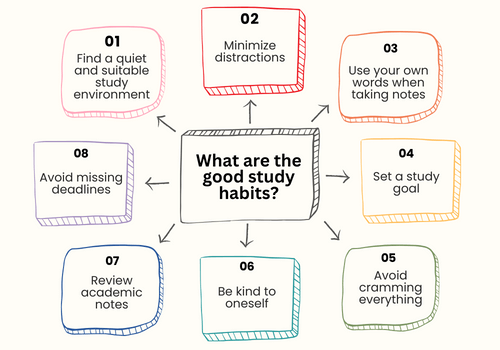8 Good Study Habits For University Students
May 08, 2024
Anis

Developing effective study habits is essential for college students to excel academically and maintain a healthy balance between their academic and personal lives. Good study habits not only enhance learning but also contribute to improved time management, reduced stress, and increased productivity.
In the dynamic environment of higher education, cultivating these habits early on can significantly impact students' overall success and satisfaction with their university experience.
This article will explore eight study habits for college students that they can adopt to optimize their study routines and achieve academic goals.
What are the good study habits?

Studying can be challenging for college students who lack the appropriate techniques. Some may struggle with fever, academic pressure, or demotivation due to a lack of understanding of the importance of study habits.
Developing a study routine doesn't necessarily mean adhering strictly to a rigid schedule and spending long hours studying each day. Instead, it involves establishing routines that enhance effectiveness during study sessions.
So, here are eight essential study habits that college students must develop.
1. Find a quiet and suitable study environment
Finding an appropriate study environment is essential for effective learning. Such environments may include university libraries, public libraries, cafes, or designated study areas at home. The right setting can significantly enhance students' concentration and productivity by minimizing distractions.
These locations typically offer a serene atmosphere with minimal noise, facilitating better focus on academic tasks. Moreover, comfortable seating arrangements is important in creating a conducive study atmosphere.
It's crucial for students to ensure that their chosen study spaces receive sufficient bright lighting, whether from natural sunlight or lamps, to optimize their learning experience. Additionally, it's advisable not to remain in one place for too long, as prolonged sitting can negatively impact posture and lead to boredom.
2. Minimize distractions
Minimizing distractions, particularly from social media and app notifications like from e-commerce platforms, is crucial for cultivating effective study habits. Many of these notifications and updates are insignificant and can disrupt concentration and productivity during study sessions. So, what steps can college students take to ensure that adopting this habit leads to productive study sessions?
As college students, they must develop soft skills, including time management techniques like the Pomodoro Technique, where study sessions are divided into focused intervals with short breaks. This method helps maintain concentration and prevents burnout. During these brief breaks, students can engage in activities such as browsing their social media accounts or stretching to refresh themselves before resuming their studies.
Another effective approach is to activate the "Do Not Disturb" (DND) mode on their smartphones. By selectively enabling notifications for specific chats or apps, students can minimize distractions and concentrate on their academic tasks without interruption.
3. Use your own words when taking notes
Taking notes using own words is a fundamental aspect of developing good study habits for students. Instead of mindlessly copying down information from lectures or textbooks, paraphrasing and summarizing in their own words can enhance comprehension.
By rephrasing information correctly, they are actively engaging with the material and processing it on a deeper level. This not only helps clarify complex concepts but also aids in connecting new information with existing knowledge, fostering a more comprehensive understanding of the subject matter.
Moreover, using their own words allows them to personalize their notes to suit their learning style and preferences. They can tailor the language and structure to best suit their understanding, making it easier to review and revise later on.
Additionally, paraphrasing encourages critical thinking and analytical skills as they evaluate and interpret the information in their own terms. This active involvement in the note-taking process promotes active learning and retention, ultimately leading to improved academic performance.
4. Set a study goal
Setting a study goal is essential for establishing good study habits for students in tertiary level. By establishing clear objectives for their study sessions, students can boost motivation, focus, and productivity.
Initially, defining a study goal offers direction and purpose to the learning process. Whether it involves mastering a particular topic, completing practice problems, or preparing for an exam, setting a clear goal helps students prioritize their study efforts and manage their time efficiently.
Furthermore, having a study goal enables students to track their progress and evaluate their success. Breaking down larger objectives into smaller, manageable tasks allows students to monitor their achievements and celebrate milestones. This sense of accomplishment reinforces motivation and sustains their dedication to their studies.
Moreover, students can better manage their study time by establishing deadlines and timelines to achieve their learning objectives. Structuring study plans and allocating sufficient time for each task helps prevent procrastination and ensures productive and focused study sessions.
Additionally, setting a study goal encourages students to adopt strategic study strategies tailored to their specific objectives. Whether it's active reading, note-taking, or problem-solving, students can select the most appropriate methods to support their learning goals and optimize their academic performance
Also read: 6 Learning Techniques To Excel In Academics
5. Avoid cramming everything at the last minute

Avoiding last-minute cramming is a crucial aspect of cultivating good study habits for college students. While the temptation to cram before exams may seem appealing, it often leads to increased stress, reduced retention of information, and ultimately, poorer academic performance.
Cramming everything at the last minute undermines effective learning and understanding of the material. Instead of absorbing and comprehending concepts over time, students who cram tend to memorize information temporarily, leading to surface-level understanding and a higher likelihood of forgetting the material in the long run.
Furthermore, cramming can have detrimental effects on mental and physical well-being. The intense pressure and stress associated with cramming can result in anxiety, sleep deprivation, and overall exhaustion. This not only negatively impacts academic performance but also affects overall health and well-being.
Moreover, spreading out study sessions over time allows for better retention and consolidation of information. By adopting a consistent study schedule and reviewing material regularly, students can reinforce learning and increase their chances of long-term memory retention.
Additionally, avoiding last-minute cramming provides students with the opportunity to identify and address any areas of weakness or misunderstanding well in advance of exams. This allows for more effective use of study time and the implementation of targeted study strategies to address specific challenges.
6. Be kind to oneself
Being kind to oneself is an essential aspect of fostering good study habits for college students. While striving for academic excellence is admirable, it's equally important for them to maintain a healthy and balanced approach to their studies.
Students need to recognize that setbacks and challenges are a natural part of the learning process. Rather than being overly critical or self-deprecating when faced with difficulties, they should practice self-compassion and acknowledge that mistakes are opportunities for growth and learning.
Moreover, setting realistic expectations and goals is key to avoiding unnecessary stress and pressure. Students should strive for progress rather than perfection, understanding that academic success is a journey that involves both successes and setbacks along the way.
7. Review academic notes

Revisiting academic notes is an important practice for university students aiming to cultivate effective study habits.
This is because reviewing class notes, lecture materials, and textbook readings plays a big role in strengthening learning, improving comprehension, and fostering long-term retention of information.
Moreover, regularly reviewing notes enables students to actively engage with the material. Rather than merely absorbing information passively during lectures or study sessions, they must actively process and integrate new knowledge with their existing understanding to promote deeper learning and honing critical thinking skills.
Additionally, reviewing academic notes offers students the chance to organize and synthesize information effectively. By condensing complex ideas into concise notes or outlines, students can create useful study aids that facilitate efficient review and preparation for exams or assignments.
8. Avoid missing deadlines
College students must develop effective time management skills by allocating sufficient time to complete academic tasks or revisions while maintaining a balanced life as students.
Why is this important? Missing deadlines is something they must avoid during their college years. While having fun with friends is important, they also need to prioritize their academic assignments to graduate and lead successful lives in the future.
Therefore, deadlines for tasks such as submitting assignments, quizzes, or participating in group projects are equally significant for achieving a balance between academic and professional success and growth.
Meeting deadlines fosters discipline and time management skills, which are invaluable both academically and in future career endeavors. Additionally, it allows students to maintain a sense of control and momentum in their academic pursuits.
By staying organized and proactive, students can avoid the last-minute rush and ensure they have ample time to review and revise their work, leading to better quality outcomes and increased learning opportunities.
Kickstart your education in Malaysia
We'll help you find and apply for your dream university
You might be interested in...
- What to Do After IGCSE/O-Level? Best Study Pathways in Malaysia
- Why AI in Education Matters?
- EdUHK Wins Grand Prize at iCAN 2024 Achieves the Best Performance among Hong Kong Universities
- Sunway University Ranked Malaysia's No. 1 Private University in 2025
- A Sunway University Student's Journey from Cerebral Palsy to Graduation
- APU Dominates the 2024 Private Education Excellence Awards with Dual Wins
- The Young & the Wired: How Youth are Redefining the Digital Era?
- Promoting Inclusivity at Malaysian Universities: Tips for Malaysian and International Students
- Taking IELTS test in Malaysia: Tips, Tricks, and Key Info
- Sunway University Tops Times Higher (THE) Rankings in Malaysia
 +60142521561
+60142521561





